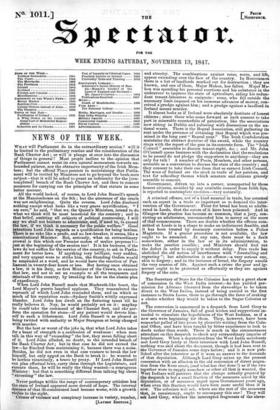A criminal offence, not of a kind unusual in trade,
has assumed such an aspect in a trade so important as to demand the inter- vention of the Government. Flour for bread has been so aclulte-: rated in Leeds, that the eaters of it have been poisoned. And in Glasgow the practice has become so common, that a jury, con- victing an adulterater, recommended him to mercy on the score of that commonness. There are doubts whether the offence com- mitted at Leeds is in a shape to make an indictment feasible, and it has been treated by summary conviction before a Police Magistrate. If a graver procedure is not available, the law ought to be amended. At any rate, there must be a fault somewhere, either in the law or in its administration, to make the practice possible ; and Ministers should find out
i the defect n order to supply it without delay. Free trade has abolished the old notion of interference with "forestalling and regrating "; but adulteration is an offence—a very serious one, akin to forgery; and in the instance of bread, the forgery assails the very sources of life. Against such a crime the poor and ig- norant ought to be protected as effectually as they are against forgery of the coin.


























